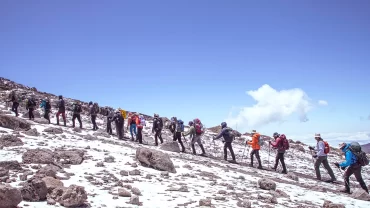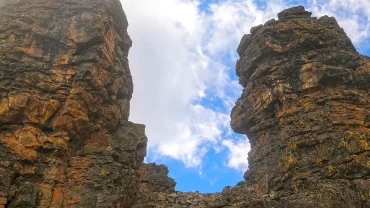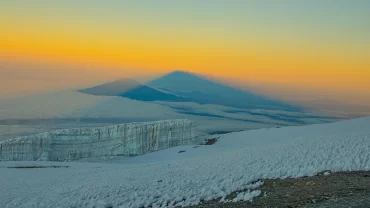Mount Kilimanjaro, the tallest peak in Africa, stands at 5,895 meters (19,341 feet) above sea level. While thousands of adventurers attempt to conquer its summit each year, few could succeed without the invaluable assistance of Kilimanjaro porters and guides. These dedicated professionals are the backbone of every trek, ensuring climbers have a safe, comfortable, and successful journey to the top.
Why Are Porters and Guides Essential for a Kilimanjaro Climb?
Unlike other high-altitude climbs, Mount Kilimanjaro does not require technical mountaineering skills. However, the trek is both physically and mentally demanding, requiring careful planning and the right support system. Choosing a reputable outfitter that assembles a skilled team of porters and guides on Mount Kilimanjaro is crucial to ensuring a safe, comfortable, and successful ascent. These professionals play a vital role in enhancing summit success rates, managing logistics, and creating an overall enriching trekking experience through their expertise, guidance, and unwavering support.
What Do Kilimanjaro Porters and Guides Do?
Guides: The Leaders and Safety Experts.
Guides are responsible for leading the trek, setting the pace, and ensuring climbers’ safety. Their responsibilities include:
- Navigating the best routes to avoid unnecessary risks.
- Monitoring climbers for symptoms of altitude sickness.
- Providing encouragement and motivation throughout the trek.
- Sharing knowledge about the mountain’s history, geology, and wildlife.
- Overseeing the general operations while in the field
Porters: The Backbone of the Trek
Porters are responsible for carrying essential supplies such as tents, food, and personal belongings. A typical porter carries up to 20 kg (44 lbs) while trekking the same steep and rugged terrain as the climbers. Their duties include:
- Transporting heavy gear between camps.
- Helping with tent setup
- Helping with meal preparation and water collection.
Cooks: Fueling the Climbers
The mountain’s extreme conditions require a high-calorie diet to sustain energy levels. Cooks play a crucial role in preparing nutritious meals that keep climbers well-fed and hydrated throughout the trek.
The Daily Life of a Kilimanjaro Porter
A typical day for a porter starts before dawn. After waking up and having a quick meal, they pack up camp and set off ahead of the trekkers to reach the next stop in time to prepare camp before climbers arrive. They endure harsh weather, long walking hours, and altitude changes while carrying heavy loads. Despite these challenges, many porters take immense pride in their work, finding joy in helping climbers achieve their summit goals.
Ethical Considerations: Supporting Fair Treatment of Porters and Guides
Unfortunately, not all porters receive fair wages or proper equipment. Some are underpaid, overworked, and lack appropriate clothing or footwear. As responsible trekkers, choosing an ethical tour operator ensures that porters and guides receive especially those who are members of the potters welfare organizations which will ensure the following:
- Fair wages and proper tipping.
- Adequate meals and accommodations during the trek.
- Access to quality gear and medical support.
Organizations like Kilimanjaro Porters Assistance Project (KPAP) work to improve working conditions for these hardworking individuals. Supporting companies that partner with KPAP is a great way to ensure ethical trekking.
How to Prepare for Your Climb with Respect for Your Team
To show gratitude and respect to Kilimanjaro porters and guides, trekkers can:
- Pack light to reduce the burden on porters.
- Follow recommended tipping guidelines to ensure fair compensation.
- Treat the crew with kindness and appreciation.
- Choose a responsible operator that upholds ethical standards.
Conclusion
Climbing Mount Kilimanjaro is a once-in-a-lifetime experience, made possible by the hard work and dedication of Kilimanjaro porters, cooks and guides. These dedicated professionals go the extra mile to provide a safe and unforgettable experience for every trekker. By understanding their invaluable role and advocating for fair treatment, climbers can contribute to a more ethical and rewarding trekking experience.
Are you planning your Kilimanjaro adventure? Choose a responsible trekking company and embark on your climb with gratitude and respect for the team that makes it all possible!





Comment (0)